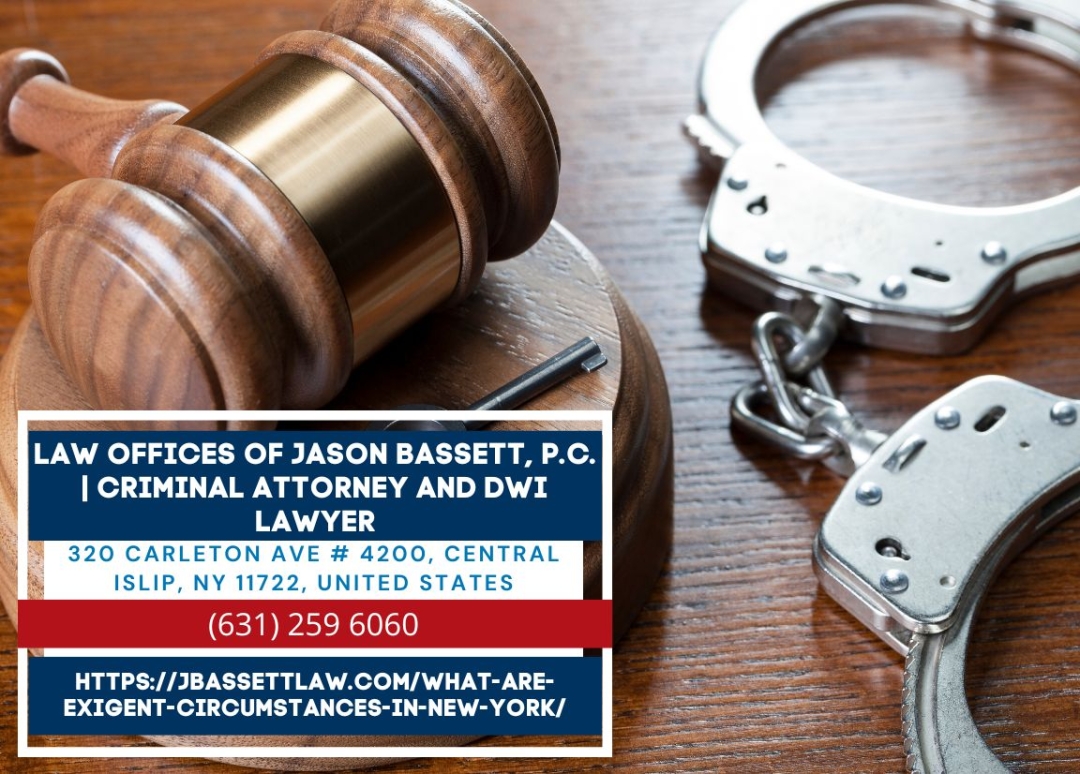Long Island criminal defense attorney Jason Bassett (https://jbassettlaw.com/what-are-exigent-circumstances-in-new-york/) has provided an in-depth look into the legal concept of exigent circumstances in New York. Exigent circumstances allow law enforcement to conduct searches or make arrests without a warrant when urgent situations demand immediate action. These exceptions to the Fourth Amendment’s warrant requirement typically arise when there is an immediate threat to public safety, a risk of evidence destruction, or a suspect attempting to evade capture. Courts in New York apply strict standards to ensure that law enforcement does not overstep constitutional protections.
In cases where law enforcement conducts a search without a warrant, challenging the legitimacy of exigent circumstances is often a crucial defense strategy. If law enforcement acted without proper justification, any evidence obtained may be suppressed, which can significantly impact a prosecution’s case. Long Island criminal defense attorney Jason Bassett has experience handling unlawful search and seizure cases and understands how these legal principles apply in New York. New York law requires that officers demonstrate a compelling need for immediate action when justifying a warrantless search. The Court of Appeals has ruled that exigent circumstances must be supported by specific and articulable facts, not speculation. In People v. Gokey, the court held that police officers may not search a container found near an arrestee unless there is a clear justification beyond the arrest itself.
Under normal circumstances, law enforcement must obtain a search warrant from a judge before conducting a search or entering a private residence. A warrant is issued only if probable cause exists and must specify the location and items subject to search. However, exigent circumstances create an exception to this requirement when waiting for a warrant would result in evidence loss, jeopardize lives, or allow a suspect to escape. New York courts carefully scrutinize these exceptions to ensure law enforcement does not misuse them. Unlike cases involving standard search warrants—where courts review the justification before the search occurs—exigent circumstances are evaluated after the fact. If a defense attorney challenges the validity of a warrantless search, prosecutors must prove that law enforcement had no reasonable alternative but to act immediately. Long Island criminal defense attorney Jason Bassett notes that understanding these legal precedents is essential for individuals facing criminal charges.
For a warrantless search to be upheld under New York law, officers must establish a compelling and immediate need for action, demonstrating that the situation left no time to obtain a warrant. There must be a lack of reasonable alternatives, proving that waiting for a warrant would have compromised safety or evidence. Officers must also present objective and articulable facts, ensuring that the decision to conduct a search is not based on mere speculation. New York courts reject broad claims of urgency and require officers to justify their actions based on specific circumstances. Law enforcement carries the burden of proving that immediate action was the only viable option.
Several circumstances may justify warrantless searches, including the hot pursuit of a suspect. If a suspect flees into a private residence, law enforcement may enter without a warrant to prevent escape. Courts, however, impose limits to ensure the search does not extend beyond what is necessary to apprehend the suspect. Law enforcement may also act without a warrant to prevent immediate danger or harm, such as responding to a violent incident or providing emergency medical assistance. If officers reasonably believe that crucial evidence will be destroyed before they can secure a warrant, they may conduct a search. However, New York courts scrutinize these claims to ensure that law enforcement had no reasonable opportunity to obtain judicial approval.
New York courts evaluate exigent circumstances based on the totality of the circumstances. Judges assess whether an officer’s decision to act without a warrant was objectively reasonable, considering factors such as the severity and immediacy of the situation, the availability of alternative methods such as securing the premises while obtaining a warrant, the nature of the suspected crime and whether it involved imminent harm and whether law enforcement contributed to creating the urgency themselves. Even when exigent circumstances exist, officers must also have probable cause before conducting a warrantless search. If probable cause is lacking, evidence obtained may be ruled inadmissible in court. New York courts impose strict limits on law enforcement discretion to prevent misuse of this legal exception.
Several court rulings have shaped how exigent circumstances are applied in New York. In Payton v. New York, the U.S. Supreme Court ruled that warrantless home entries are unconstitutional unless an actual emergency exists, striking down a New York statute that previously permitted such arrests. In People v. Jimenez, the New York Court of Appeals rejected a claim of exigent circumstances where law enforcement failed to provide specific evidence of an immediate risk. In People v. McBride, the court ruled that hot pursuit does not automatically justify warrantless home entry unless the underlying offense is serious.
Defendants facing charges stemming from warrantless searches can challenge the justification for the search. Defense attorneys may scrutinize whether the emergency was real and immediate or based on speculation, argue that law enforcement had time to obtain a warrant but failed to do so, file a motion to suppress evidence obtained through an unlawful search, and establish violations of Fourth Amendment protections by demonstrating that officers acted in bad faith or without probable cause. If a court finds that a warrantless search violated constitutional protections, any evidence obtained may be ruled inadmissible, potentially leading to a reduction or dismissal of charges.
Exigent circumstances provide law enforcement with a narrow exception to the warrant requirement, but courts in New York apply strict scrutiny to these cases. If law enforcement acts improperly, evidence obtained may be challenged in court. Long Island criminal defense attorney Jason Bassett emphasizes that individuals facing criminal charges should seek strong legal representation to protect their rights. The Law Offices of Jason Bassett, P.C., is dedicated to defending clients against unlawful searches and holding law enforcement accountable. Those facing criminal charges can benefit from experienced legal guidance to navigate these issues.
About The Law Offices of Jason Bassett, P.C.:
The Law Offices of Jason Bassett, P.C., provides dedicated legal defense for individuals facing criminal charges in New York. Attorney Jason Bassett has extensive experience handling cases involving search and seizure laws, ensuring that clients’ constitutional rights are protected. The firm is committed to providing strong legal representation in cases involving warrantless searches, unlawful arrests, and other criminal defense matters.
Embeds:
Youtube Video: https://www.youtube.com/watch?v=SBjNuPiu4iM
GMB: https://www.google.com/maps?cid=695024758410642184
Email and website
Email: bassettlaw@live.com
Website: https://jbassettlaw.com/
Media Contact
Company Name: Law Offices of Jason Bassett, P.C.
Contact Person: Jason Bassett
Email: Send Email
Phone: (631) 259-6060
Address:320 Carleton Ave Suite 4200
City: Central Islip
State: New York 11722
Country: United States
Website: https://jbassettlaw.com/







